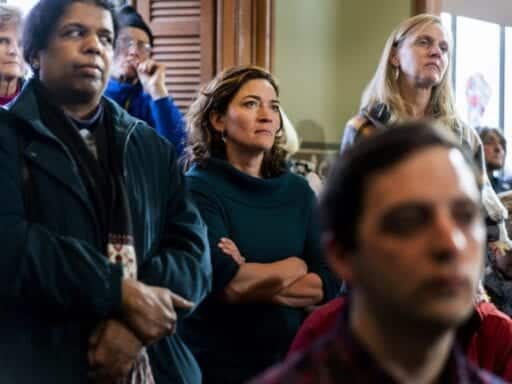In the final stretch of the 2020 primary race, things are just getting started.
CONWAY, New Hampshire — One month out from the “first-in-the-nation” primary, less than one-third of New Hampshire registered voters have “definitely” made up their mind. In Iowa, with 23 days and counting until the caucuses, about the same share of voters has decided for sure, according to a recent CBS/YouGov poll of the two early states.
“I’m torn now; I wasn’t torn before,” New Hampshire voter Tina Craig of Albany, a Sen. Elizabeth Warren supporter, told me after seeing Sen. Amy Klobuchar speak.
All the attention presidential candidates are lavishing on the early states breeds indecision.
“Getting any voter locked into a candidate is hard,” said Hanover voter Robert Cornell, who was leaning toward Warren after seeing her in person but also considering Sen. Bernie Sanders. “Being face to face, hearing her ideas went further with me.”
Some voters I’ve talked to across New Hampshire still have a long list of candidates they’re looking at, but most have narrowed it down to two or three people. Even though the national media likes to silo candidates into “progressive” and “moderate” lanes, voters don’t make decisions as neatly. Some voters like former Vice President Joe Biden and self-avowed democratic socialist Bernie Sanders; others are choosing between progressive Elizabeth Warren and more moderate candidates like Sen. Amy Klobuchar and former South Bend, Indiana, Mayor Pete Buttigieg.
“[Warren] and Buttigieg are right there at the top,” said Concord voter Robert Fried. “I want to see which one will capture swing voters and Republican women.”
Even though we’re in the final stretch of the 2020 primary race, in some ways, it’s just getting started.
The big field is helping keep people undecided. But that’s also just the way Iowa and New Hampshire voters are.
Voters “have no reason to make up their mind early” with such a large and ideologically diverse field, University of New Hampshire pollster Andy Smith told me recently.
New Hampshire voters in particular are famous for deciding on a candidate at the last minute — sometimes right up until they go into the voting booth. And many of the dozens of voters I’ve spoken to at candidate events say that while they’re narrowing down to a few candidates, they still haven’t found The One yet.
That tracks in Iowa as well. The Hawkeye State holds caucuses on February 3 where voters literally have to sort themselves into groups based on the candidates they support. Voting happens out in the open, and candidate “viability” — or whether a candidate can reach a 15 percent threshold — matters hugely to their chances. This also increases the importance of people who support lower-tier candidates that won’t reach the viability threshold and have to throw their vote behind someone else.
“The second choices are going to matter more than they usually do because there’s going to be a lot of not viable candidates,” John Deeth, a longtime party activist and member of the Johnson County Democrats executive committee, told me recently.
Veteran Iowa pollster Ann Selzer told me it’s no surprise to her that just 31 percent of respondents said their minds were made up in the recent CBS/YouGov poll. That number went up slightly in the most recent Des Moines Register/CNN/Mediacom Iowa poll Selzer’s firm conducted, where 40 percent of likely caucusgoers said they had made their mind up about a candidate. Still, another 45 percent said they could be persuaded.
“What people don’t understand is the caucus is designed for people to keep an open mind,” Selzer said. “The process encourages that. There’s no advantage is there, to locking in on a candidate.”
With New Hampshire’s primary being held about a week after Iowa’s February 3 caucuses, a lot could change between now and primary day on February 11.
“Unlike a general election when there are numerous offices on the ballot, in the NH primary there’s only one decision a voter has to make, so they have the luxury of waiting until the last minute to make up their mind,” said former US Ambassador Terry Shumaker, a longtime New Hampshire politico supporting Biden. “That’s why the primary’s very difficult to predict, to poll.”
New Hampshire voters may still be undecided, but they want someone who can beat Trump
There’s a familiar refrain circulating around New Hampshire voters: “anyone but” President Donald Trump.
“I want that guy out so bad, I can’t even tell you. Getting Trump out, that’s number one,” Conway voter Mike Manson told me.
Beyond that, many voters haven’t decided who they’ll vote for. Manson himself wasn’t entirely sure which candidate was best to do that; he said Klobuchar was top of his list, but he was also considering Biden and Buttigieg.
“We have so much talent, it’s really hard to choose,” said voter Margaret Merrill of Madison, who was trying to decide between Biden and Klobuchar. Merrill added she’d “take the garbage collector” over Trump, and was eager for Democrats to select their nominee.
“The sooner we focus on a candidate, the sooner we can get working,” she said.
Author: Ella Nilsen
Read More



